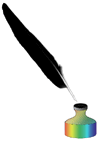16-July-99 On language study
.
.
.
Remind me sometime to write a book Language Learning on the Right Side of the Brain. Well, all right, someone better qualified than I should do it. But by now I've tried to learn a bunch of languages, and made a little success with some of them.
I started with Hebrew school, let's see, when I was in seventh grade, and then took four years of French in high school and a year of German in college. After my sophomore year in college I went on a bicycle trip in Europe, from Southampton England through London to Dover, across to Oostend and Bruges in Belgium, from Cologne to the Black Forest, through Switzerland to Geneva (several portions of the trip so far by train), by train to Bordeaux, from there to Paris by bicycle, to Brussels by train, from there to Rotterdam by bike. I studied Dutch on my own for a couple of weeks before leaving home.
Even after four years of French in high school and reading some real literature, I didn't have a gut appreciation of the reality of languages until I was on the continent. People were really speaking French and German just like what I had studied! It wasn't all an elaborate hoax. I mean, I didn't think it really was all an elaborate hoax, but I wasn't sure in the same way until I was over there. Can you dig it? It's the difference between knowing something intellectually and really knowing it deep down. One of the high points of that trip was a night in a youth hostel in France when there was nobody there but the French-speaking housefather, two kids from Austria, and me. The Austrians were having communication troubles, and I had to translate from French to German and back. It worked well enough.
I used my French and German a lot in graduate school. German especially was important for many classical papers in topology. One of the Russian professors at Brandeis had the idea that mathematicians were good at languages, and he taught a non-credit class in Russian just for math grad students. That's where I learned the Cyrillic alphabet and a little Russian, but not enough to read math papers and nowhere near enough to converse.
Things were quiet, language-wise, for most of a decade after that (you can think in those terms when you're 55!). At that point came the Hungarian phase, during my faculty days at UMass Boston. A Hungarian guy who taught in the German department started a Hungarian class one day a week during lunch hour. I thought it was terrible that I didn't know a single word (wrong, I knew “goulash” and “czardas”) of my grandfather's native language, so I studied with them.
Another decade later I was at work at an electronics test equipment company, minding my own business. The engineering manager walked up and said, “Dean, do you have a current passport? Blaupunkt is having some trouble with that software you wrote, and you're going to Germany next week.” Oops. I got along OK and rode the train two hours out of Munich on my own to visit some friends, but there was an undercurrent there. That company did a lot of business in Japan. I figured that some day I'd get sent to Tokyo on about the same amount of advance notice. I learned a little about the writing systems from a Japanese man at work, and got a book on Chinese-Japanese characters, but didn't really make any progress with the language.
Sure enough, a couple of years later I was waiting for a bus from the airport to downtown Tokyo, just hoping I would really meet up with the people from work there (bizarre side note: a somewhat older Japanese woman in a big fur coat who was waiting for the bus next to me said, out of the blue, “Do you believe in reincarnation? I do.”). It worked out, but as soon as I got back I signed up for a class in Japanese at the Boston Center for Adult Education. Yes! My triumph when I went back to the same trade show the next year was that I walked into a housewares store and, all in Japanese, asked, “Do you have any chopstick rests? I'll take four, please” and paid the right amount.
Helpful hints in Japanese:
1. You can carry your side of a conversation if all you say is “Ah, so desu ka?” (“Oh, really?”) whenever there is a pause. Well, eventually people will catch on.
2. The most useful phrase I know in Japanese is “Chotto sumimasen ga...” (“Excuse me a sec, but...”). At that point you have politely got someone's attention and you can hope they can continue in English.
-- more about this another day --
 | ||||